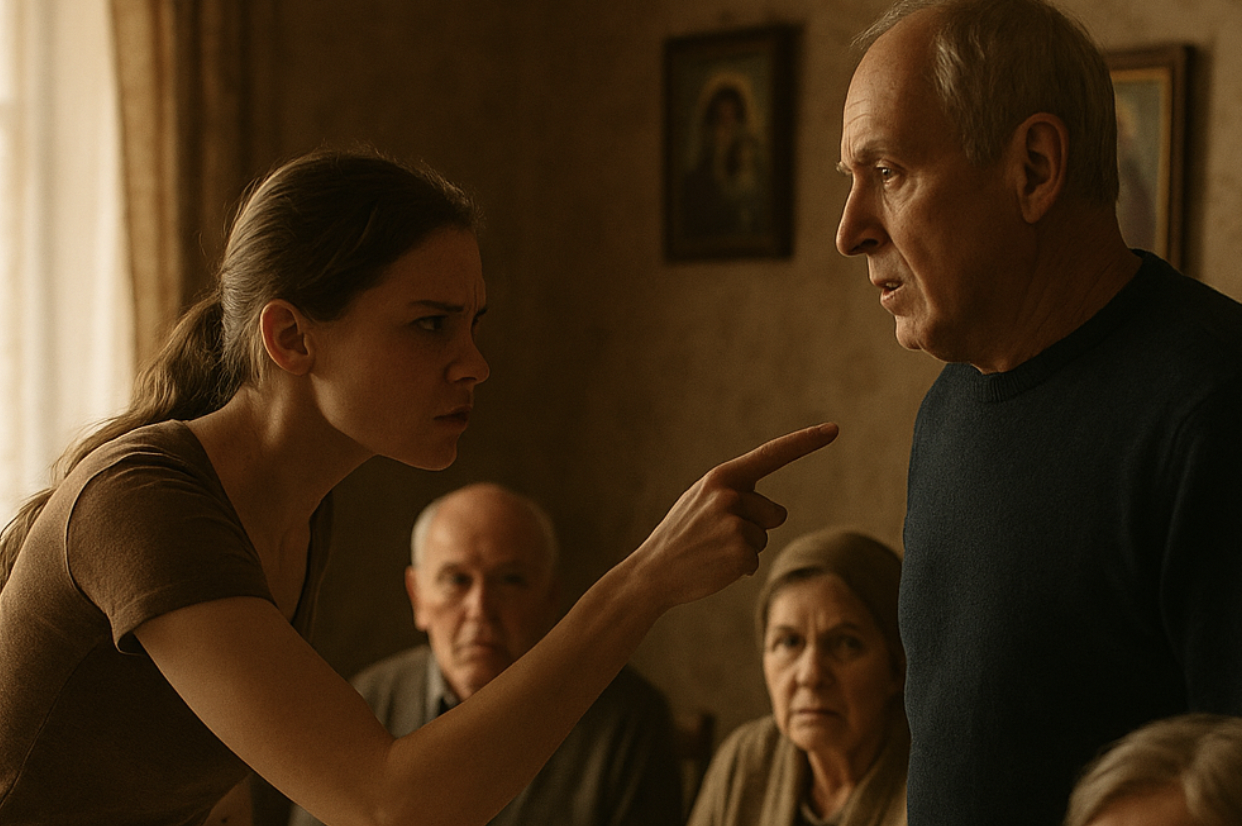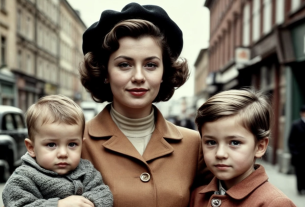Anna knew the day would be hard from the morning on, when Sergei started fussing around the apartment, rearranging chairs and checking whether there were enough plates. His relatives always arrived in a crowd—his sister Larisa with her husband Volodya, Aunt Klava, his cousin Igor with his wife. And every time, Anna felt not like the mistress of her own home, but like some temporary tenant they tolerated out of politeness.
“Maybe this time we could do without them?” she suggested timidly as she chopped the salad. “Let’s celebrate just the three of us—quietly, cozily.”
Sergei didn’t even lift his head from the newspaper. “Anya, come on. We always celebrate together. It’s family.”
“Family,” Anna thought bitterly. For him, maybe. For her it was a group of people who treated her apartment as theirs, her fridge as communal, and her as the household staff.
At two in the afternoon the doorbell rang. Larisa burst in first, as always, loud and brazen. A forty-year-old woman with dyed hair and a habit of speaking in raised tones, she headed straight for the refrigerator.
“Seriozha, hi!” She pecked her brother on the cheek and immediately opened the fridge. “Oh, why is it so empty in here? Anechka, where’s the cake? I thought you baked something special.”
“The cake is in the box on the table,” Anna answered evenly, continuing to portion the salad onto plates.
“Store-bought?” Larisa wrinkled her nose. “Well, Anechka, you’ve got hands, don’t you—you could have made an effort.”
Next came Volodya, Larisa’s husband—a short man with a receding hairline and a perpetually dissatisfied expression. He silently walked into the living room, gave the furniture a critical once-over, and sat down in an armchair.
“Serge,” he called from the other room, “when are you going to replace this couch? It’s totally sagged. Hard to sit on.”
Aunt Klava, a thin woman of about sixty with a sharp chin and equally sharp remarks, came in last. She always arrived with the air of someone personally asked to set another person’s life in order.
“Oh, Anechka, dear,” she swept her gaze over the kitchen, “why isn’t your sink shining? And these towels look gray. A woman should keep the house up—after all, it’s her face.”
Anna clenched her fists but held her tongue. Sergei came up behind her and put a hand on her shoulder—a gesture meant to soothe her that somehow irritated her even more.
“Mom, Aunt Klava, come to the table,” he said in a peacemaking tone. “Anna worked so hard—she made all sorts of things.”
At the table, what Anna mentally called “the family court” began. Larisa took some salad and immediately grimaced.
“Tastes a bit bland. Anechka, don’t skimp on salt—men like things saltier. And not enough mayonnaise. Dry.”
“And I told Seryozhka yesterday,” Aunt Klava chimed in, “that you two should really do some renovations. The wallpaper’s completely faded. And in general, a young family needs to think about the future.”
Anna ate her salad in silence, trying not to hear the commentary. But when the hot course was served—her signature chicken in cream sauce—Aunt Klava tasted it and winced.
“Strange you even got married with culinary skills like these,” she said out loud what she was thinking. “The chicken’s bland, the sauce is watery. In our day girls were taught to cook from childhood.”
Larisa laughed.
“Oh, come on, Aunt Klava, at least Anechka is slim. Actually, too slim. You don’t look healthy, Anya. Wouldn’t hurt to put on five or seven kilos. You look sickly—like you two can’t afford proper food.”
Volodya set down his fork and suddenly said,
“I just went into the bathroom—there’s mold in the grout between the tiles. Anechka, you need to keep an eye on things like that. It’s unsanitary. A housewife should notice that sort of thing.”
Something clicked in Anna’s head. She slowly rose from the table, feeling a wave she had held back for years rise inside her. Sergei looked at her in surprise.
“Anya, where are you going?”
She swept her eyes over the assembled relatives—Larisa with her brazen smirk, Volodya with the self-satisfied look of someone who’d pointed out a flaw, Aunt Klava with her perpetually disapproving face.
“You know what,” she said quietly but distinctly, “that’s it. Enough.”
She walked to the door and flung it wide open.
“Don’t you ever set foot here again, you’re not even my kin!”—this celebration had become the last straw for the daughter-in-law, and she forced them to respect her.
A dead silence fell over the room. Larisa was the first to recover.
“Anechka, are you out of your mind? We’re family!”
“Family?” Anna laughed, but it wasn’t a happy laugh. “Family is when people respect each other. You’ve been coming to my house for years, eating my food, criticizing every little thing and thinking that’s normal!”
Sergei stood up, looking at his wife in confusion.
“Anna, calm down. They don’t mean any harm…”
“No harm?” She turned to her husband, and he saw something in her eyes he hadn’t noticed before—fatigue, pain, and resolve. “Sergei, if you say one more word in their defense right now, you can go along with your relatives. I am the mistress of this home, and I will no longer allow myself to be treated this way!”
He opened his mouth, but meeting her gaze, slowly closed it.
Aunt Klava began to fume indignantly.
“How dare you! We’re older, we’re more experienced! Young people have gotten completely brazen!”
“Out!” Anna stood by the open door, her eyes fixed on the relatives. “Out of my house. Now!”
Larisa stood up, breathing heavily.
“Seriozha, you won’t allow—”
“Seriozha won’t allow or forbid anything,” Anna cut her off. “Because it isn’t his decision. This is my home, my patience—and it’s run out.”
The relatives began to gather themselves, reluctantly. Volodya grumbled something about “young fools,” Aunt Klava shook her head, and Larisa tried to explain something to her brother on the way out. But Sergei was silent, watching his wife.
When the door closed behind them, the apartment became astonishingly quiet. Anna leaned her back against the door and closed her eyes.
“Anya…” Sergei began.
“No, now you listen to me,” she opened her eyes and looked at him. “For five years I’ve endured their rudeness. For five years I’ve listened to how I’m a bad wife, a bad homemaker, a bad cook. For five years I’ve let them rummage through our cupboards, criticize our furniture, our apartment, my appearance.”
Sergei took an uncertain step toward her.
“They didn’t mean to hurt you. It’s just their way…”
“That’s their way, and these are my boundaries,” Anna said firmly. “And if you want this marriage to continue, you need to respect those boundaries.”
She went into the room and started clearing the table. Her hands trembled with nerves, but inside there was a strange relief—as if a huge weight had fallen from her shoulders.
“I’m not forbidding you to see them,” she went on, stacking the plates. “Meet them wherever you like, every day if you want. But in this home, no one will tell me how to live, what to cook, or how to look.”
Sergei helped her clean up in silence. Several times he started to say something and fell silent again. At last he stopped, a stack of plates in his hands.
“Anya, I… I didn’t realize it was so hard for you.”
She looked up at him.
“You did realize. It was just easier for you to pretend everything was fine than to deal with their displeasure.”
He set the plates on the table and came closer.
“Forgive me. Really. I thought you just… didn’t like the noise, the fuss. I didn’t think it was about disrespect.”
Anna paused, wiped her hands on a towel.
“Sergei, I’m not going to be the perfect wife by their standards. And I won’t silently endure insults in my own home. If they can’t treat me like a human being, then they don’t need to come.”
“And what if they… what if they don’t want to talk to me anymore?” he asked uncertainly.
Anna shrugged.
“That will be their choice. And your choice is between them and me.”
They stood in the kitchen amid the untouched dishes prepared for the festive table, and Sergei understood that it really was a choice. Not between his relatives and his wife, but between the habit of avoiding conflict and the willingness to defend the one you love.
“All right,” he said at last. “I’ll talk to them.”
“You don’t need to ‘talk,’” Anna corrected him. “You need to explain. Explain that I’m not the help in this house, not an object for criticism, and not a topic for discussion. I’m your wife, and I deserve respect.”
Two weeks passed. Sergei really did talk to his relatives—at length, painfully, with shouting and hurt feelings. Larisa took offense, Aunt Klava was indignant, and Volodya called Anna a “spoiled princess.” But Sergei, for the first time in a long while, didn’t try to make peace and smooth things over for everyone. He laid out the rules clearly: either respect for his wife, or no contact at all.
They celebrated the next holiday at Larisa’s. Sergei went alone, and Anna felt relieved—at last she wasn’t being forced to take part in family rituals where she had no place.
And a month later Larisa called. Her voice sounded unusually quiet.
“Anechka, may I come by? To talk.”
When her husband’s sister sat in Anna’s kitchen, awkwardly turning a teacup in her hands, Anna realized something had changed. Larisa no longer surveyed the apartment with a critical eye, didn’t comment on the food, didn’t dispense advice.
“I wanted to apologize,” she said at last. “Seriozha explained it to me… I didn’t realize we were so… that you took it that way…”
“Larisa,” Anna gently interrupted her, “it’s not about how I ‘take’ it. It’s about how people should be treated.”
The woman nodded.
“May I… may I come sometimes? Just to visit, like a normal person?”
Anna smiled—for the first time sincerely while talking to her husband’s relative.
“Of course you may.”
From then on, family celebrations were different. Not because Anna had “won a war,” but because she had learned to defend her boundaries. Her husband’s relatives no longer took her for granted and no longer allowed themselves brazen remarks. Aunt Klava was still critical, but now kept her opinions to herself. Volodya stopped pointing out the house’s shortcomings. And Larisa even started asking for recipes.
Anna understood a simple truth: you cannot earn respect through submissiveness. You can only demand it. And once she finally demanded respect for herself, it turned out people were perfectly capable of showing it—no one had ever required it of them before.
Sergei changed too. He no longer tried to smooth things over at his wife’s expense, no longer asked her to “understand and forgive.” He learned to see the difference between family harmony and coercion to endure. And their own relationship only benefited—hidden resentment disappeared, and honesty and mutual support took its place.
That festive day when Anna finally said “enough” did not mark the end of family relations, but their new beginning—one based on respect rather than the habit of tolerating disrespect. And it turned out to be much better.


